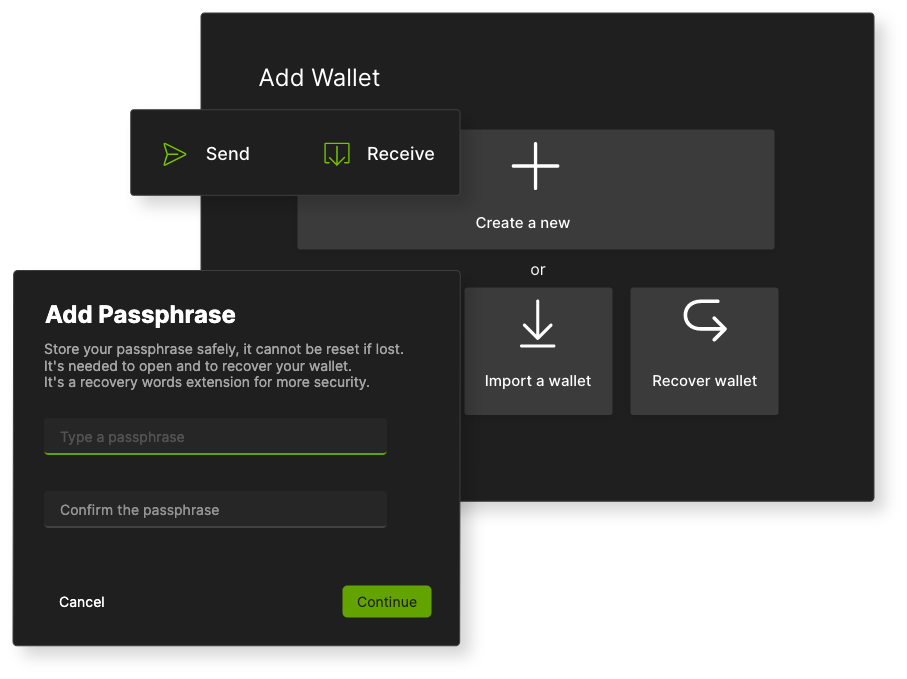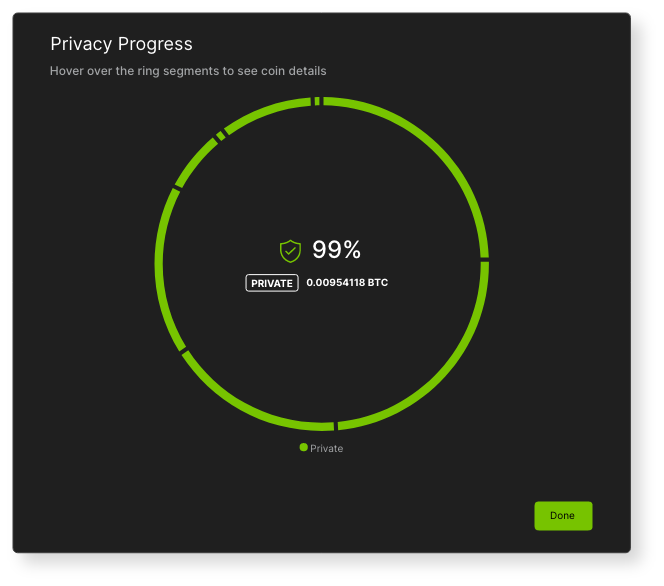
Bitcoin is not private
Bitcoin transactions are visible to the public, which helps prevent inflation and fraud without the need for third-party reliance. However, this transparency also comes with privacy concerns.
UTXOs, short for Unspent Transaction Outputs, are the coins within the Bitcoin network. Each UTXO possesses a distinct transaction history and is verified by all full nodes. Consequently, the traceability of all Bitcoin transactions is maintained consistently.
Take back your privacy
Privacy by default
Begin with privacy as the default setting. All data is automatically routed through Tor. Your wallet is synced using block filters on the client side. Enhance on-chain privacy through the integrated coinjoins.
Experience additional features and customization options with hardware wallets, personalized privacy settings, coin management, privacy alerts, transaction optimization, individual full node, tools for developers, and beyond.

Why Wasabi Wallet
Download  OPEN SOURCE
OPEN SOURCE
Wasabi Wallet is freely available as open-source software, allowing individuals to view, validate, and participate in the development of the code.
 STRONG PRIVACY
STRONG PRIVACY
Your privacy is safeguarded by the use of coinjoins, block filters, and the Tor anonymity network, ensuring that neither the public nor developers can compromise it.
 SELF-CUSTODIAL
SELF-CUSTODIAL
You have complete control over your private keys, which means that if you don't have the keys, you don't have the bitcoin.
 SIMPLE
SIMPLE
Wasabi Wallet provides excellent privacy for Bitcoin users, offering a straightforward and functional wallet equipped with all the necessary features.
 ACCESSIBLE
ACCESSIBLE
WabiSabi is the underlying coinjoin protocol that enables the mixing of any amount, ranging from 5,000 satoshis to 40,000 BTC and everything in between.
 AFFORDABLE
AFFORDABLE
WabiSabi represents an innovative coinjoin protocol, prioritizing blockspace efficiency to help reduce mining fees.
A coinjoin is...
A joint bitcoin transaction involves multiple users working together to create a single transaction that includes inputs and outputs from various users.
A coinjoin transaction consists of multiple standard outputs with identical amounts, making it extremely challenging to trace them back to their original inputs.
Coinjoins enable users to obscure the origin of their coins from the general public, thereby ensuring the fungibility of their UTXOs on the public Bitcoin network.

Mining fees and coordinator fees
When engaging in coinjoining, it is important to remember that you are responsible for covering the mining fees associated with the block space you utilize. Additionally, coordinators may impose a fee for their services. It is essential to configure both fees accordingly to prevent excessive payments.
FAQ
A coinjoin involves a joint transaction among several participants.
Typically, although not always, it includes various standard output denominations that individuals are required to split their coins into. This complicates the process for external entities to track the destination of a specific coin (unlike traditional bitcoin transactions, which typically involve a single sender and recipient).
Coinjoins can be conducted using non-custodial tools such as Wasabi Wallet, which removes the possibility of funds vanishing or getting stolen. The funds will consistently remain in a bitcoin address controlled by the user, with no ability for the coordinator to modify the transaction or divert the funds.
Coinjoin is essentially the process of combining transactions with another party to create a joint transaction when making a transaction.
Wasabi's coinjoin implementation is inherently trustless. Participants are not required to trust each other or the coordinator. With only the user holding the private keys, the transaction can only be signed by them after ensuring everything is in order. This ensures that coins cannot be stolen and the relationship between inputs and outputs remains confidential.
Wasabi is compatible with hardware wallets using the standard Bitcoin-core HWI, and it is feasible to coinjoin directly to a hardware wallet. However, the functionality to sign a coinjoin transaction with a hardware wallet has not been integrated.
Below is a compilation of the hardware wallets that are officially supported.
No. The characteristics of Wasabi, such as Tor and coinjoin, necessitate significant computational power, which is presently unattainable on a smartphone.
There are numerous reasons why choosing to exclusively use bitcoin is the most rational decision. Bitcoin presents a unique chance to establish a system of free and stable currency. If we are successful, it could lead to a community of independent individuals. However, if we fail, it could result in a dystopian future. We cannot afford to waste time and effort; this important task demands our complete focus. Every line of code dedicated to supporting a worthless cryptocurrency detracts from valuable developer resources that could be used to address genuine issues.
Wasabi Wallet is compatible with a variety of operating systems that support 64-bit and arm64 architecture, such as Linux, MacOs, and Windows. It is designed to run efficiently on minimal storage, CPU, and Memory, making it suitable for a wide range of hardware configurations. To view the full list of officially supported operating systems, please refer to the documentation.
All Wasabi network traffic goes via Tor by default -there's no need to set up Tor by yourself. If you do already have Tor, and it is running, then Wasabi will try to use that first.
It is possible to disable Tor within the Settings. It is important to remember that even with Tor turned off, your privacy is maintained, unless you engage in coinjoining or broadcasting a transaction. If you choose to coinjoin, the coordinator may be able to identify the connections between your inputs and outputs using your IP address. On the other hand, if you broadcast a transaction to a full node that is monitoring your activity, it will be able to establish the link between your transaction and your IP address.
Reusing addresses poses a significant threat to privacy as it connects multiple blockchain transactions, providing evidence that they originate from the same source. To ensure maximum privacy and security when using bitcoin, it is recommended to assign a unique address to each sender. Once an address has been used to receive a coin, it should not be utilized again. Furthermore, it is advisable to request a new bitcoin address from the recipient when making a transaction. Wasabi's user interface actively discourages address reuse by eliminating previously used addresses from the GUI.
Some have contended that the term "bitcoin address" is not an appropriate name for this concept as it suggests that it can be reused similar to an email address. A more suitable name could be "bitcoin invoice".
Bitcoin does not offer complete anonymity, but rather pseudonymity, with the pseudonyms being the bitcoin addresses. Refraining from reusing addresses is akin to discarding a pseudonym once it has been utilized.
The password you establish serves as the 13th seed term (as outlined in BIP 39) and is utilized to cipher the private key of the extended private key (as outlined in BIP 38) in order to produce an encrypted secret that is kept on the computer.
Wasabi Wallet exclusively stores the BIP38 encrypted blob, requiring you to input the passphrase in order to conduct transactions or participate in coinjoin from the wallet.
The recovery words backup or the computer will grant access to your bitcoin when the passphrase is entered. It is crucial to keep this password secure in case your backup is compromised, as it is the sole protection for your valuable sats.
Utilizing a lengthy and unpredictable passphrase is crucial.
